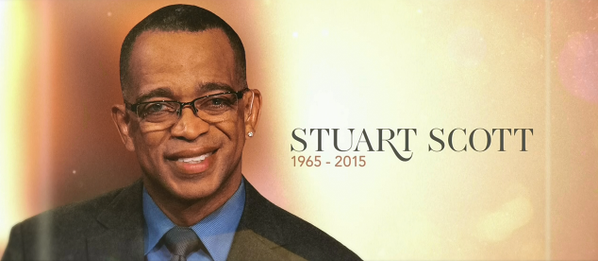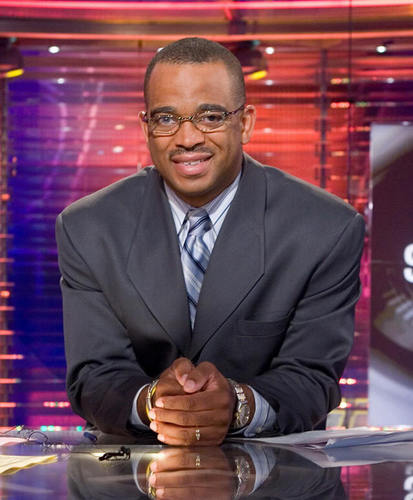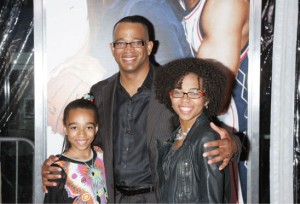He proved that boundaries could be broken, that dreams do come true, and that no battle was ever too big to fight. He was a fighter, he never stopped fighting. He was as cool as the other side of the pillow.
Stuart Scott was a man who millions of sports fans knew as a media juggernaut, cancer patients knew as an inspiration, and to Michael Eaves, he was a very good friend.
The two met in 1997 at the National Association for Black Journalist (NABJ) in Chicago. That’s when Eaves, a young sportswriter, had his first conversation with the ESPN giant. For the next several years they would also play golf at the convention, often arriving in the host city a few days early just to get on the course. Their last game together was at Merion Country Club in Philadelphia in 2011.
Since 2007 Scott had been battling cancer on and off. Ultimately it was the disease that took his life on Sunday. But anyone who knew him knows that’s not what he’d want to talk about. He was a glass half full kind of guy.
J.A. Adande of ESPN remembers his former colleague as a guy who always wanted to have a good time.
“We were at a club in LA one night and at the end of the evening Stuart somehow wound up with a mic in his hand. So he started freestyle rapping as everyone filed out. He was actually pretty good. I think it was a hip-hop dream come true for him.”
Becoming a hip-hop artist may not have been a reality, but if becoming the top sports broadcaster in America with a hip-hop vibe was, well he certainly reached that goal.
“Stuart helped bring hip-hop into sports commentary and thus into society at large. In the early 1990s hip-hop was still considered anti-establishment,” said Adande.
He was also known for his witty catchphrases, but wasn’t limited to them, said Eaves, an Emmy Award-winning sports journalist.
“As far as the critics are concerned, here’s what they always missed. He was really good at his job. Like stupid good. People would tend to get caught up in the catchphrases as a reason to say he wasn’t a good anchor. If they actually listened to him, they would realize that he was one of the best broadcasters of all-time. Think about it, how many times do you ever remember him making a mistake on the air? Even the best of the best flub a word here or there. Do you ever remember Stuart doing that?”
Eaves says there was much more knowledge behind each of his broadcast’s than people gave him credit for.
“In between every “boo-yah” and “as cool as the other side of the pillow” was a stat or fact that gave the highlight context and told you why it mattered. That’s broadcasting. And Stuart was a true pro.”
Yahoo! Sports writer Marc Spears tells Sheridanhoops.com his memorable style will be forever missed.
“He was a very humble man who a trendsetter and mentor for black’s in sports journalism and all aspiring journalists. Respected widely.”
Since 1993 Scott has been gracing the sports world with his charismatic personality. The guy didn’t have an off switch. He began his tenure at ESPN by hosting the late night SportsCenter before moving to more prominent roles with the network. He had reached a level of fame after covering multiple NBA Finals, Super Bowls, World Series and NCAA tournaments.
For Scott, there was no better moment in his professional career than the night he was honored with the Jimmy V Award at the ESPYs in July. He had been in the hospital just days prior but he was determined to be at the awards show. His seven-minute speech was heartbreaking and motivational. While on stage he share passionate words that will forever correspond with the way he lived.
When you die, it does not mean that you lose to cancer. You beat cancer by how you live, why you live, and in the manner in which you live. – Stuart Scott
WATCH: Stuart Scott’s ESPYs speech
Eaves said Scott never stopped living life.
“I could go on forever about my friend and his positive, joyful approach to life – even in the face of the cancer that was ravaging his body.”
It was family over everything for Scott. Taelor, 19, and Sydni, 15, were used to their father cheering them on from the bleachers at a soccer game or attending a school function with them. Throughout his cancer treatments he said the fight wasn’t just for him, but for his girls.
David Aldridge of NBA.com knew Scott personally. He saw first-hand the impact he had on so many people.
“All you had to do was see how young reporters at the yearly NABJ conventions reacted when Stuart was in the room. He was such an inspiration to them, and so many of them have shared stories over the years of how down to earth and approachable he was.”
Aldridge always knew about his friend’s illness, but avoided the conversation.
“I never talked to him about the cancer, because who on earth wants to be reminded of such a horrible thing that’s inside them? But now I think maybe I should have asked him about it, because in a perverse way I think he was as proud of how he fought cancer as he was anything else that was a part of his life.”
While the cancer has been around for eight years, Scott didn’t allow anything to get in the way of work. He would often leave his chemotherapy treatments and head directly to an ESPN set. He loved his job. What’s not to love? Scott interviewed the best of the best, a list that includes Michael Jordan, LeBron James and even Bill Clinton and Barack Obama.
Beau Estes of NBA TV had the chance to interview Scott five years ago, a chance he couldn’t pass up. He calls it an unforgettable experience.
“He’s the most confident guy I’ve ever met. At age 36 Scott participated in the New York Jets minicamp. I wasn’t sure if he was joking at first. But he seriously thought he could make the team. He never gave up. That’s why he was so good at what he did.”
After spending some time with him, Estes realized Scott wasn’t performing for an audience, he was the same person when the red light turned off.
“He didn’t need to care about every person out there, but I think he did. He didn’t want to disappoint anyone.”
His standards were high, maybe too high. He wanted to be the best, and for many, he already was. Scott didn’t need to change his unique ways for anyone despite all of the pressure be normal.
“Stuart represented an entire generation of sports fans and sports journalists who watched games through a different prism – a prism shaped by non-mainstream experiences. And because he refused to change his style or approach – even when so many critics tried to shame him into doing it – the industry eventually realized how valuable that audience was,” said Eaves.
The impact of his death can be felt in all circles of life. Kobe Bryant called him a game changer, Tiger Woods said he was a hero, and Kiefer Sutherland said he was his inspiration.
Along with millions across the world, Eaves is remembering Scott today.
“Most people will remember him for his game-changing work on TV, and they should. But I will mostly remember him for his appreciation for life and his unwillingness to ever give in or give up.”
Despite all the treatments and hospital visits, Scott never stopped living. He treated each day as a gift and an opportunity to grow as a person. By his own definition, cancer didn’t beat him, he beat cancer.
Brett Poirier is a contributor to Sheridan Hoops. Follow @BrettNBA


